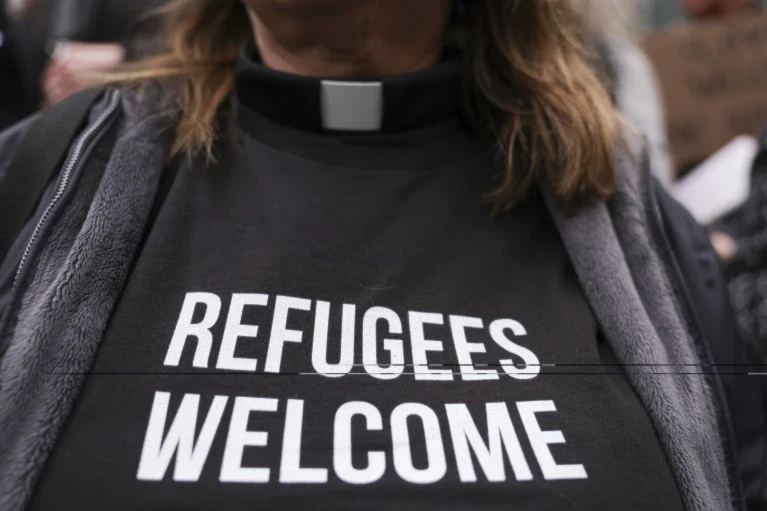US judge orders refugee entry while Trump offers migrants cash to exit
Federal judge Jamal Whitehead rules that the Trump administration must admit around 12,000 refugees, rejecting its attempt to limit a previous court decision.
-

Pastor Jennifer Castle joins others outside the US District Court after a federal judge blocked US President Donald Trump's effort to halt the nation's refugee admissions system, February 25, 2025, in Seattle (AP)
A federal judge has ordered the administration of US President Donald Trump to admit approximately 12,000 refugees into the country, delivering a legal setback to the White House’s ongoing efforts to reshape US immigration policy.
The order, issued Monday by US District Judge Jamal Whitehead, clarifies a previous appeals court decision that permitted the suspension of the refugee admissions system. While the Trump administration argued the ruling only applied to 160 refugees who had confirmed travel plans within two weeks of a January executive order, Whitehead rejected that interpretation.
“The government’s interpretation is, to put it mildly, ‘interpretive jiggerypokery’ of the highest order,” Whitehead stated in his ruling. “It requires not just reading between the lines but hallucinating new text that simply is not there.”
The lawsuit was filed in February by several organizations, including the Jewish refugee non-profit HIAS, Church World Service, Lutheran Community Services Northwest, and a number of individuals. They argued that many refugees, already approved and having sold their belongings in preparation for travel, were abruptly left in limbo due to Trump’s executive order.
Last month, the US Conference of Catholic Bishops announced an end to its 50-year partnership with the federal government on refugee services due to the Trump administration's funding halts.
Refugee resettlement has long been considered a legal pathway toward US citizenship and has been broadened under former US President Joe Biden to include climate-affected populations.
Judge Whitehead cites misreading of appellate decision
Judge Whitehead had originally blocked the executive order halting refugee admissions in February, finding that it likely violated the 1980 Refugee Act. Though that ruling was overturned by the Ninth Circuit Court of Appeals in March, the appellate court required the government to admit individuals who had already been granted refugee status and had travel plans.
“Had the Ninth Circuit intended to impose a two-week limitation, one that would reduce the protected population from about 12,000 to 160 individuals, it would have done so explicitly,” Whitehead wrote. “This Court will not entertain the government’s result-oriented rewriting of a judicial order that clearly says what it says.”
Trump’s administration has taken a hardline stance on immigration, marked by high-profile deportations and militarized removal operations. His campaign rhetoric often targeted immigrants, and his policies reflect an ideological shift away from refugee resettlement as a humanitarian priority.
The latest court decision shows the legal limits of executive power in altering refugee admissions without legislative backing and affirms protections for those already approved under existing protocols.
US offers $1,000 stipend to encourage migrants to 'self-deport'
The Trump administration will offer a $1,000 stipend and travel assistance to migrants who choose to voluntarily "self-deport", saying it costs less than the $17,000 average for arrest and deportation. Since January 20, Trump's administration has deported 152,000 people, fewer than the 195,000 deported under Biden in the same period last year.
Efforts to encourage voluntary departures include legal threats and deportations to harsh prisons. “If you are here illegally, self-deportation is the best, safest and most cost-effective way to leave,” said Department of Homeland Security (DHS) Secretary Kristi Noem. A rebranded Customs and Border Protections (CBP) home app now supports the process. Trump said in April that some migrants may be allowed to return, “If they’re good… we’re going to work with them.”
DHS added that self-deporting "may help preserve" legal return, though no path was detailed. The advocacy group Make the Road NY criticized the program as "cruel" and advised migrants to consult lawyers.
Read more: 'We know where you live': Judges kin targeted after anti-Trump rulings

 4 Min Read
4 Min Read








